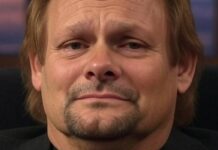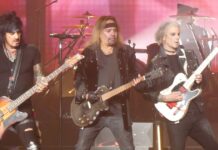Foo Fighters’ Nate Mendel kicks off Medicine At Midnight Radio on Apple Music Hits to celebrate the band’s 10th studio album released last week. Mendel compared an album he made to Weezer’s Pinkerton. Medicine At Midnight Radio will include six hour-long episodes each hosted by a separate band member where they’ll explore their personal inspirations, musical journeys, and reflect on the creative process behind the album. On the inaugural episode, Mendel shares his thoughts on the album, reflects on forming Sunny Day Real Estate and the hardcore scene in Washington, DC, and recalls the story of the cassette tape that lead him to join Foo Fighters. He also welcomes special guest Joe Plummer (Modest Mouse, Shins, Cold War Kids).
Key quotes previewing the episode are below — feel free to use and credit Medicine At Midnight Radio on Apple Music. Fans can tune in to Medicine At Midnight Radio every day this week, beginning today (2/8) at 4:00p PST on Apple Music Hits at apple.co/FFRadio or anytime on-demand. The series continues tomorrow with Chris Shiflett’s episode.
Nate Mendel Shares His Thoughts on Foo Fighters’ Medicine At Midnight Album…
I like this record, this Medicine At Midnight record. It’s grown on me. It was fun and weird to record. It was a bit of a new thing for us in the way it came together and the way it was constructed and the inspiration for it. It feels fresh to me, and 25 years in, I think that’s a good thing to feel about your band and your music.
Nate Mendel Reflects on Forming Sunny Day Real Estate…
I was living with this guy in one of those college houses with a bunch of guys living there. Actually, what we’d do is take acid and go in the basement and jam. I’d play bass and he’d play guitar. In some moment of drug-inspired weirdness, “Hey, man, we should start a band.” Dan, the guitar, was like, “Only if we can find a great drummer,” knowing now that he fully had in mind who the drummer would be at the time and was planning on trying to recruit him, but put this mystical aspect on it probably because we were high out of our minds.
We started off as a three-piece, and then we stumbled across this really brilliant singer in Jeremy Enigk that turned it from a goofy, proggy punk rock band into Sunny Day Real Estate, which a lot’s been said about that band. It’s near and dear to my heart. Some people peg it with being something that was inspirational for the following emo genre that developed. I don’t know so much about that, but that’s the lore of the band.
I played on two Sunny Day Real Estate records. There was four total. I played on the first two, and then left the band to do Foo Fighters. The first one has songs that people know and it’s more popular. The second one is our Pinkerton and is a little more complex, less immediate and much less popular, even though it was such a dark period. I mean, it was really weird. The band was broken up and it was just a damn mess, but sometimes the best music comes out of that.
Nate Mendel Reflects on The Hardcore Scene in Washington, DC…
There was this great hardcore scene in Washington, DC. As it developed over time, the music morphed into something that was a little bit more interesting and less about just outright politics and the interests of 15-, 16- and 17-year-old kids, and kids that were getting to be a little bit older and wanted to talk about things other than how [inaudible] Reagan was. That’s where the genesis of Rites of Spring was. It was really influential, particularly to me and my friends that put that band, Sunny Day Real Estate, together. It came from that and some bands surrounding that kind of scene.
Nate Mendel Recalls Joining Foo Fighters…
The cassette Joe and I were talking about was the first album, the first Foo Fighters record. At that point in time, it was a series of demos that Dave had recorded, and he duped them onto cassettes and they just floated around town and most of the musicians had them, including me. I got it about the same time that Sunny Day Real Estate was falling apart and that I was getting to know Dave. We’d hung out a few times. He’d come to a couple of Sunny Day shows, and we’d hung out outside of that a couple of times.I got wind that the songs on that cassette may turn into a band, and so I just worked up the nerve to call him and talk to him about it. We got together and jammed a little bit. It was funny. It was at his house. It was just me and him at first. He was playing through a tiny amp and I was playing through a karaoke machine. Then we got together with our first drummer at his parents’ house in the basement and jammed, and it was upstairs in the kitchen. He just said, “Hey, you guys want to be a band?” I’m like, “Yes, absolutely, let’s do this,” and so here we are.
The cassette was great. We talked about maybe rerecording it now that there was a band, but it was like, “Why? This is awesome. Let’s just put this out, because there’s not really a lot to be improved upon.” The song on it that really caught my attention and made me want to be in the band was Exhausted. It reached out and grabbed me in a way that made me think that there was maybe some potential in this band. It had a special X factor to it.














